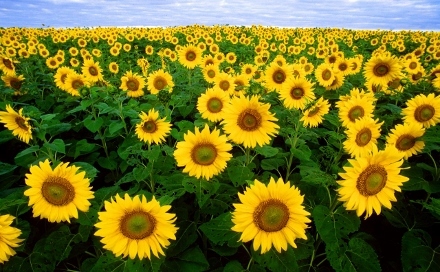Tropes ain't what they used to be. In fact, they're the opposite.
In recent decades, "trope" has come to hold one main popular meaning: "a significant or recurrent theme; a motif," as the Oxford English Dictionary began to note only as late as a 2007 "draft addition," where it cited a 1975 example from the Chicago Tribune: "Barthelme is funning with the eternal trope of fatherhood." Today, you always hear about the trope of the dysfunctional legislature, or the trope of the trigger-happy vigilante. A web search reveals that online news publications have used trope this way more than 200 times in the last month.
This "recurrence" definition rings ironic, because you could sum up the 500-year-old original meaning of trope as a verbal or musical innovation -- a trope used to be not a motif, a type or a cliché, but the reverse.
In Greek, a tropos is a turn. So a heliotrope is a plant that turns toward the sun, and a tropic latitude marks the line where the sun's yearly poleward course turns back toward the equator.
The "turn" root inspired 17th-century literatus John Dryden to complain that Juvenal's farfetched proto-satirical "tropes" (imaginative phrases that turned away from the words' primary meanings) sometimes puzzled him. And when 10th-century musicians embellished on Gregorian chants, the changes were called tropes because they turned away from liturgical templates, eventually so much that the 16th-century Council of Trent banned them.
"Dressed to kill" and "fishing for a compliment" are proper tropes. "The sexy librarian trope" (Maureen Dowd in the New York Times, 2010) and "the classic trope of halcyon memory" (Richard Brody in The New Yorker, 2012) aren't tropes, because they don't turn words in unusual ways. Further, these examples cite types, not phrases; tropes are words, not concepts.
"Tinhorn" (a faker) "einstein" (an idiot) and "sick" (admirable) started out as tropes, because they deliberately turned words away from their original meanings. Is the new "trope" itself a trope, then? No, because it came into use out of ignorance, not creativity: Somebody confused a turn of phrase (such as "a bad mofo," which was a trope) with a concept (THE bad mofo, which was an archetype).
After millions of repetitions, a trope may shed its trope-ishness, i.e. its originality, to become a cliché. (The word cliché, by the way, comes from the repetitive sound a typesetting machine used to make.) The trope error could have grown from clichés: Someone got called a "golddigger" (a true trope), which became a cliché and a type, and people started calling the type a trope. It wasn't. Or it hadn't been. The perversion of trope could also have gained traction from writers dropping the R in topos, which means a literary commonplace.
Might as well give up; battles against usage corruption are always lost. In "Crimes and Misdemeanors" (1989), Woody Allen may have complained that some yutz pronounced nuclear "nuke-ya-ler," but he could have predicted that some future president, certainly not knowing the garble had received contemporary dictionary sanction, would do the same. Already in 1865, Lewis Carroll acknowledged defeat when he had Humpty-Dumpty say, "When I use a word, it means just what I choose it to mean." Still, when words acquire opposite meanings by accident, you might agree with the doomed egg: "There's glory for you."
* * *
In 2004, I wrote a similar rant on the word "empathy" in L.A. Weekly, here. It's about the sixth item down, headed "Words' Worth."
MUSIC HISTORIAN STEVEN ISOARDI COMMENTS: "Finally, someone is calling out the twists to which this word has been subjected. But there is more. I've been catching up on the academic jazz/black culture literature and it is pervasive there. Rarely does a page go by without some use of it. And the uses! Not only a noun, but a verb, an adjective, an adverb, a gerund. When reading this stuff, it's akin to hitting a road bump every page. Perhaps it's become the academic equivalent to 'like' in Valley-girl speak?! And it is one of the most aesthetically unappealing words in the language..."

